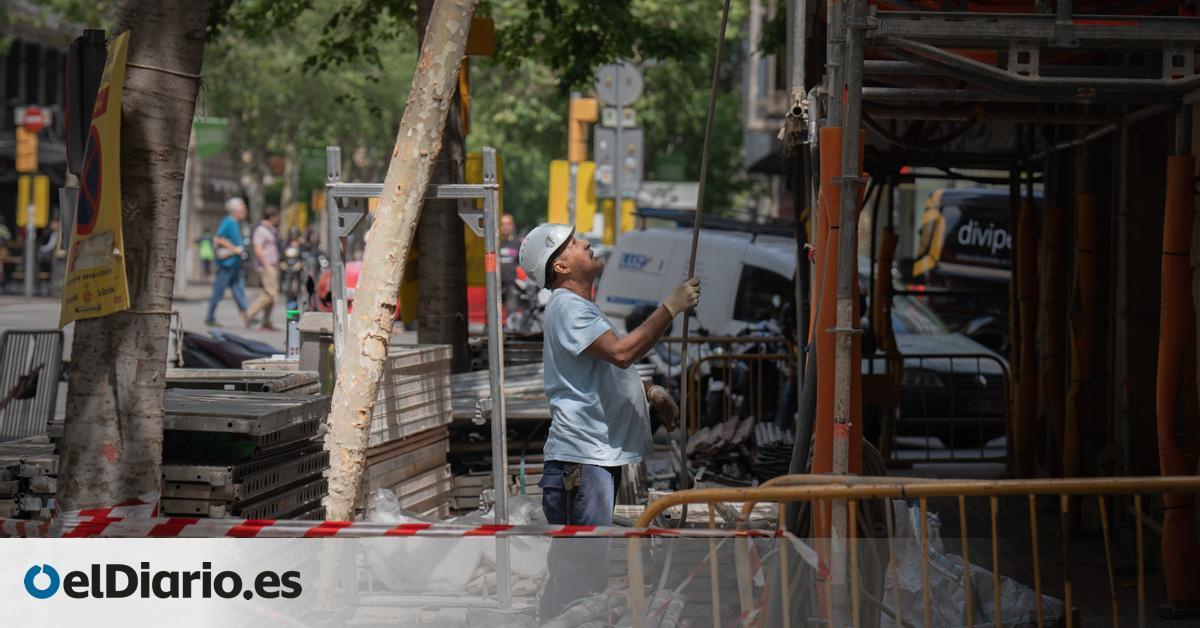
Businesses should immediately define prohibited outdoor tasks when there are extreme weather conditions, such as heat waves. “It will be a new obligation of the occupational risk prevention plans,” they advance from the Ministry of Labor about the decree that the Government approves this Thursday. In addition, in general, the legislation will include by law the mandate to “modify or reduce” the working hours when the AEMET issues alerts for adverse meteorological phenomena of red or orange level, they add in the department directed by Yolanda Díaz.
Working under extreme heat: “This is unbearable, we are without air or awnings”
Further
The two measures are part of a broader royal decree-law that the coalition government will approve this Thursday in an Extraordinary Council of Ministers with measures to deal with drought and extreme heat. The new labor guarantees are expected to come into force “immediately”, they explain in Trabajo, the day after the publication in the BOE, like the rest of the norm.
The urgency of deploying the decree and these two measures is justified in the Executive by the rise in temperatures that we are already witnessing, with temperatures in April typical of July, and the need to protect workers from risks that are sometimes fatal. .
As happened to José Antonio González, a street sweeper in Madrid who died last year while cleaning the streets of the capital in the middle of the afternoon during a heat wave. His son explained to this medium the exhaustion of his father days before his death, his own fear of heat stroke and the lack of adaptation of schedules in the company due to the peak in thermometers.
A few days later another worker died in a warehouse in Móstoles. At the beginning of August, a 38-year-old man died after another heat stroke in a warehouse in the Fuente del Álamo region of Murcia. At the end of August, a 45-year-old worker in the construction sector lost his life for the same reason, also in the Murcian community.
Two new obligations
To avoid more deaths and accidents for this reason, the Ministry of Labor has included these two measures to reinforce prevention in the decree. The first, on tasks that are prohibited in extreme weather situations, is included in the occupational risk prevention plans of each company. These plans are mandatory in all companies and must contain preventive measures against existing risks for the workforce.
Work now places a new express duty on companies: to identify tasks that cannot be carried out in extreme weather conditions. These may be due to temperatures, such as 39 degrees in the sun on the street, but also for other reasons, such as gusts of strong winds or rain, the Ministry specifies.
The key to determining which tasks can be carried out and which ones should not be evaluated in each company, always with the premise of guaranteeing the health and safety of the workers. “Something that in some of the deaths due to heat stroke that we have unfortunately seen is obviously not happening,” they lament in Labor.
Secondly, when there is an orange or red alert from the AEMET, the decree will broadly extend a new obligation to “modify or reduce” the hours of workers abroad. Indoors, there is already a regulation that determines the maximum temperatures at which workers with sedentary and light functions can carry out their tasks, recall the Ministry of Yolanda Díaz.
In addition, Health sources explain to elDiario.es that the Ministry has the National Plan for Preventive Actions for the Effects of Excess Temperatures on Health, which establishes recommendations based on their own alert levels, which is drawn up by the Institute of Health Carlos III, independent of those of the AEMET. That is why these same sources assume that there will be coordination between the Agency, which depends on Transition Ecology, Labor and this department, reports David Noriega.
“More tools” for the Labor Inspection
These new specific obligations will give “more tools” to the Labor Inspectorate to paralyze activities in those cases where the activity is not excepted and the health and safety of workers is being exposed at risk due to extreme temperatures, they maintain in the Ministry.
It must be remembered that today employers already have the obligation to protect workers from extreme heat. Thermal stress, on the rise due to increasingly frequent high temperatures, is a recognized and more than proven health risk, which in its worst expressions manifests itself in the aforementioned deaths from heat stroke. Also in the aggravation of other diseases and in the increase in occupational accidents in general, among other consequences that were highlighted in this interview from the CCOO Occupational Health department.
But that obligation is now quite generic. It is foreseen that “in outdoor workplaces and in workplaces that, due to the activity carried out, cannot be closed, measures must be taken so that workers can protect themselves, as far as possible, from the elements weather”.
Thus, with these new additions, the Government intends to further specify prevention against heat so that it can be extended with concrete measures in companies, which are forced to analyze and take preventive measures against this risk, and also facilitate control by of the labor authority. The fines for not protecting the health of workers are the highest and can reach up to 983,736 euros in the most serious cases.
Source: www.eldiario.es

